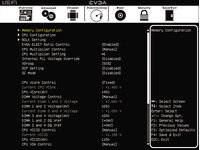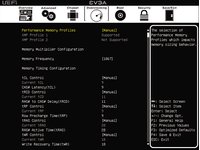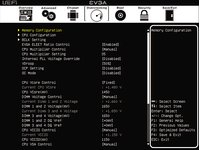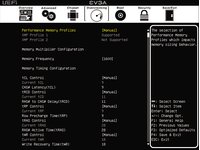Overclocking: Asus Rampage IV Extreme Versus EVGA X79 FTW
Many companies claim to offer the best overclocking for your money, yet only two compete for the best overclocking at the very highest price point. Today we put those claims to the test, including a full set of benchmarks to analyze performance gains.
Overclocking Stability Compared
Performance is obviously going to be one aspect of today’s article, but variations in base clock can’t always be repeated on different processors. So, we began by shooting for the highest multipliers at the X79 Express' stock 100 MHz.


The spread between achievable maximum multipliers at 1.45 V is fairly large, with EVGA’s 4.6 GHz overclock falling 200 MHz behind Asus' 4.8 GHz. Additional screenshots can be found in our photo album by clicking on the above images.


The Rampage IV Extreme also jumped straight to the memory’s DDR3-2133 XMP profile, while the X79 FTW required manual timing configuration to hit a far smaller DDR3-1866 using the same 1.65 V.


Asus also hit 4.8 GHz at 133 MHz base clock, while EVGA improved its 4.6 GHz result at 4.67 GHz.


Both motherboards reached DDR3-2133 at 133.3 MHz, but the Rampage IV Extreme got there easier using the memory’s XMP-2133 setting with a manual 16x multiplier setting. The X79 FTW required full manual configuration of both its primary and secondary timings, as well as the memory multiplier.
Stay On the Cutting Edge: Get the Tom's Hardware Newsletter
Get Tom's Hardware's best news and in-depth reviews, straight to your inbox.
Current page: Overclocking Stability Compared
Prev Page X79 FTW Software Overclocking Next Page Breaking Boundaries-
EzioAs Nice article.Reply
Where is the MSI Big Bang Xpower II? That's known to be a great board for overclocking as well. -
schn1tt3r I'd love to see a comparison like this between the Rampage IV Extreme and the Rampage IV Formula. The price difference is over $100 and I don't see WHY. 8 RAM slots is something I would never fill up so the Formula and its 4 slots seems perfect to me.Reply -
hellfire24 i would take rampage iv formula.it's cheaper and provides similar features.who needs 4-way sli?Reply -
Crashman WR2Kind of a lukewarm recommendation. Just 'Tom's Hardware Approved award'Only because there aren't many readers who can get $50 of value out of its specific feature set, compared to the WS.Reply -
halcyon I wish I hadn't seen this. I really do. I have no excuse to get an X79 based system. I don't. I..do...not. I want. ...but I can't. Food. Food is important.Reply -
master9716 You guys really need to start Testing @ 5760x1080 !!! , Monitors go for really cheap on craiglist now from wholesellers , you can buy 3 24" leds for like 300 bucks so a lot of people that I know have been runing 3 monitor setups for a while.Reply -
jaquith Thanks Thomas for another enlightening Article! :)Reply
Just knowing the ASUS and EVGA from past history (LGA 1366) which may or may not play any role here, ASUS tends to (lets call it adjust) the CPU vCore and VTT/VCCSA higher than advertised vs EVGA which probably explains* the problems with both the high frequency RAM and CPU OC's.
The disturbing thing to 'me' was the regulator voltages. I know the EVGA uses 12+2 vs ASUS's 8+3+(2+2) PWM and it's all digital controlled on ASUS, (*)but IDK if the EVGA is digitally controlled which might explain the inefficiency and OC.
The EVGA has always been a very 'manual' MOBO, so in that regard I'm not surprised you had to dive into the BIOS. I have no doubts if you raised the EVGA's voltages vs a cloned ASUS optimized OC set that you'd have no problems obtaining the SAME 4.8GHz OC. Both boards offer voltage check points and I'd be very interesting how they compared.
Just the other day I updated my ASUS BIOS and right-off I noticed an increased vCore increase by +0.01v~+0.015v and as part of the documented (improvements) was 'Improved Stability' ; yeah sure if you raise the vCore or VTT/VCCSA, phase, etc profiles... Now I have to redo my validations.
The most important testing here, to me, is the Baseline Comparison which tells me EVGA has some work to do ASAP, and hopefully a BIOS update can close the gaps. Further, personally I won't buy or recommend any X79 MOBO unless it offers an 8xDIMM option. In the forum it's been very clear which X79's I recommend since day one, and the ASUS R4E has always been on top on my list if you can afford it! ;) -
spookyman Considering Ivy Bridge is around the corner. Would it be beneficial in buying a Sandy Bridge-E board?Reply
